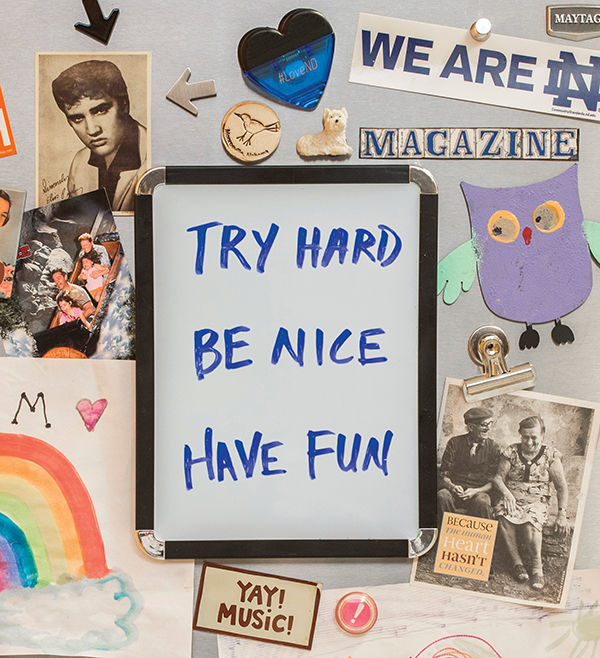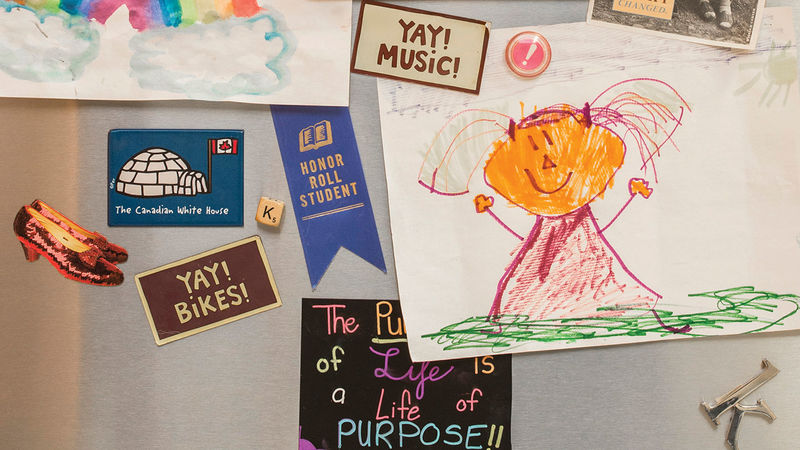I’ve made a proposal, and my children are in open revolt.
The boy brays: Uuuuuuuugh! He throws himself to the floor and begins to whimper quietly.
The girl, on the verge of fake tears herself, guns down my idea rapid-fire, as only a tween can, protesting at nearly indecipherable speed: She never has any time for herself, and she made plans to loiter downtown with her friends, and Sundays are her one day off from school and sports and theater, and she needs this free time because her life is soooooo stressful, and you DON’T UNDERSTAND and you know she hates hiking. She has honed this routine through years of practice. She’s relentless, and it will serve her well later in life when negotiations come with higher stakes.
But right now it’s threatening to ruin my week. I’m an author. I spend my days in the little attic of my three-story colonial, which looks like a refuge crammed with things I love — 60 linear feet of books, a stereo and the collected works of Bob Dylan, a fly-tying station — but is in fact a place ruled by looming publishing deadlines.
Long story short: I need to get out of the house.
My wife and I dubbed them Spontaneous Sundays. Come up with a plan to do something within a two-hour drive: a rock-climbing wall, a lake, the beach. Jump in the car and go. This day, I suggested a walk in the woods. Drive to the Poconos, see a series of waterfalls spectacular enough to be included in the national park system, find a good place to eat dinner, home by dark. Good clean family fun.
Naturally, the kids hated the idea. They always do.
At Shenandoah National Park, they were disappointed by the 70-foot falls at the end of the trail. (Daughter: “I thought it would be bigger.”) In Colorado, hiking through snow — in the last week of June! — to a crystalline high-country lake at the base of 12,000- and 13,000-foot peaks? A forced march. On the Appalachian Trail, they complained about the daddy longlegs.
In years past I would have crushed the mutiny with prejudice. I would have forced us out of the house and onto the trail, and we all would have been miserable. The kids because we were hiking, and my wife and I because we couldn’t understand how anyone could not enjoy a simple walk outdoors.
Why, we asked, was their idea of what was fun so fundamentally different from ours?
At some point early in our parenting life, my wife and I had the idea of boiling things down for our children. We wanted a few mantras that would summarize the life lessons we were trying to pass on to them. So we took up the blue dry-erase marker at the whiteboard in our kitchen and, like zealous corporate self-help consultants, set down three family rules:
TRY HARD — BE NICE — HAVE FUN

They were standard elementary school clichés, not terribly original. You don’t have to be the best, just do your best. Treat others the way you want to be treated. Above all, enjoy yourself: You’re children.
It seems strange that my wife and I felt compelled to add that bullet-point to our family mantra — to believe we needed to prescribe fun. We were putting fun into the category of things Jane and Owen should do, things that were Good For Them. We put fun on par with faithfully doing their homework, eating their vegetables and getting some exercise. Fun, as in reading is fun! . . . playing the guitar is fun! . . . computer coding is fun!
Had we checked the academic journals, the scientists would have told us we were on solid ground. Having fun is demonstrably good for you. (Leaving aside, that is, dangerous and/or potentially fatal forms of fun, like jumping off a cliff in a flying squirrel suit with a GoPro camera strapped to your crash helmet.)
Evolutionary biologists and neuroscientists are still trying to pin down the hows and whys of these obvious health benefits. Looking into the play habits of pronghorn antelopes and mountain goats in the wild, rats in the laboratory and young children on the playground, they’ve concluded that unstructured play in childhood promotes the development of healthy brains.
Having fun as a child is not just silliness, not just a blowing off of steam, but something more essential, like adequate sleep and proper nutrition.
From the beginning, we busied our children with fun. Jane listened to Baby Mozart, attended Gymboree sessions and matriculated at the local pre-pre-K programs. She started soccer the spring after she graduated from diapers. At 5 years old, she began learning the piano and joined a children’s theater program. She had brief flings with ballet and the guitar and the violin. We paid for tennis lessons and swim instruction. We signed her up for fast-pitch softball, and when she decided she wanted to take the mound, we sponsored throwing sessions with a local all-star who boasted a 0.22 ERA during her senior year in college ball.
Looking back, that youthful resume seems laughable, not just for its length but its foolish ambition.
Then again, everyone else we knew was doing the same thing. More, even.
Kids in our town were not just wrestling in the second grade, they were already aware of the benefits of cutting weight. They were going to “speed school” at a fitness center, which sounded vaguely scammy to our ears. They were playing travel soccer year-round, which meant cramming indoor practices alongside winter basketball league games. They were trying out for community theater plays in the next county or driving two hours into New York City for Broadway auditions. They were shooting polished music videos and trying to brand themselves as the next Taylor Swift on YouTube. They were signed up for horseback riding lessons and field hockey and Mandarin and —
It sounded exhausting and, for us, it was.
Eventually Jane, who is now 12, winnowed down her program. She stuck with softball but dumped the pitching lessons, and she doubled down on theater, acting in musicals year-round and taking a tap class to help her nail the production dances. With her 7-year-old brother, Owen, we’ve more or less followed his lead, and he’s decided to play one sport each season. Though we have no illusions about his athletic potential, we still send him to off-season clinics pushed by the town leagues. But he doesn’t have the wall-to-wall schedule of fun his sister had at his age. Our new-parent surge of energy had long since subsided.
Still, we feel an underlying anxiety about these scheduling changes. Part of this unease stems from competitive instinct, because we’re slackers when it comes to fun, and even adults are not immune to peer pressure. Part of it is hardwired: every couple’s desire is for their kids to be happy and successful. My wife and I can’t help but be mystified when we suggest some potentially fun (and rewarding) activity and our kids say, nah. We’re also nostalgic for our own childhoods and the fun we had throwing ourselves into everything new and unexpected. And we’re aware of how our own lives have contracted in parenthood. We know of the sacrifices we chose to make when we decided to start a family.
But if we’re being honest, our apprehension mostly has to do with what our children choose to do with their downtime. Like parents across the centuries, we can’t help judging their definition of fun against ours.
In the Age of Apple, this means a wearying (and ultimately losing) battle over the ubiquitous screens and how they use them.
We wince whenever we see Jane grab her smartphone and disappear into a world of Instagram, YouTube makeup tutorials and vertiginous group texts. I swipe through her Internet search history and see hours spent absorbing mindless media.
We see Owen disappearing into the family iPad whenever he gets access, playing such games as Pixel Gun 3D and AdVenture Capitalist. (Apparently he’s become a trillionaire buying up lemonade stands.) I once did an experiment to see how long he would stay on the device if I didn’t boot him off: Three hours and 45 minutes later, I finally sounded the alarm. The iPad had long since run out of power, and he was splayed out on the floor tethered to a charger plugged into the wall.
Our knee-jerk reaction makes us feel old-fashioned and crotchety: Why are they wasting their time with this nonsense? They’re lazy slugs. They’ll never amount to anything.
Then we think back to our own childhoods. I remember summers wasted playing video games in my basement or watching Star Wars for the hundredth time. The amount of time my wife spent on the phone gossiping with her friends can be measured not in hours or days but in months, and given that this was before the era of call waiting, it remains a sore subject with her parents.
Our children mount spirited defenses when we protest their obsession with anything that comes with a touchscreen. It is true that once we shut down the devices — and we do, on weekdays and at night — they default to healthier forms of fun. Jane finds friends to invite over and sings herself silly and practices (self-taught) gymnastics moves. Owen builds Legos and climbs trees and shoots baskets on the hoop out in front of our house. Just when we start to worry about their attention spans disintegrating to zero, we discover that when they don’t have a device in their hands, they return to their beloved books.
Much as we hate to admit it, maybe we really do need to follow the snarky advice of our tween daughter:
Relax, okay?
We’re trying. But I’m still not giving up on the hiking. Happily for Jane, I’ve come to terms with the realization that she’s just never going to be into it. As she told me once, “I’m an indoor cat.” But my son is still in play. Last summer, we ditched the girls — they went to Manhattan to see Wicked — and headed out for a modest adventure of our own. Owen and I pitched a tent in a state park and spent two days fishing and swimming. We rented a boat and took it out on the lake. We threw the football and the baseball and the Frisbee. We cooked out and built campfires and huddled in the tent under a nightlight playing a miniature board game that involves avoiding bears in the woods. I didn’t want to go home.
But the best part came a few months later: He said he wanted to go back.
David Kinney, who lives outside Philadelphia, is co-author of the newly released The Devil’s Diary: Alfred Rosenberg and the Stolen Secrets of the Third Reich. The book tells the story of a recently unearthed diary penned by one of Hitler’s close advisers.
